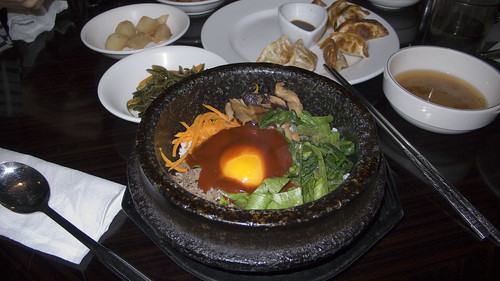Love the messenger

I’d had Korean food before, but as this was my first trip to Korea House I wanted something different, something authentic, maybe even adventurous. Friday lunch at Smart Bear is usually interesting.
PJ recommended the bibimbap, a bowl of rice covered in Korean namul with beef and an egg. Perfect, but when our waiter got around to Hannah—herself Korean—she ordered the dolsot bibimbap. Ooo! So when it was my turn I asked the waiter the obvious question: “What’s the difference between bibimbap and dolsot bibimbap?”
His answer: “Dolsot bibimbap better!”
That’s it. Better. Well of course I ordered the dolsot, and it was fantastic. Turns out “dolsot” means “stone pot.” The dish is served in a hot stone or ceramic pot hot enough to sizzle and cook anything that touches the sides. The rice gets crispy, the egg cooks, and the veggies and meat stay extra hot.
At this point, my long-time readers will expect me to make some point about how marketing messages need to be more specific than “it’s better,” how differentiation always trumps ambiguity, and how every phrase should be meaningful. But actually, his response was perfect.
It was perfect because it wasn’t in an ad, wasn’t in a datasheet, wasn’t part of a 30-second elevator pitch mechanically regurgitated on a tradeshow floor. It was from an old Korean guy who works his ass off at Korea House, possibly seven days a week, probably related to the owner. He barely knows enough English to parse my question—certainly not enough to articulate the answer—but he did his best to push me to the right choice, the one that was $1 more and 2x better.
It’s the messenger, not the message, that made the experience wonderful.
So yes, on websites you do need to be specific because websites aren’t relationships; they’re attention-getters and information-distributers. But as soon as the human relationship begins—whether by sales pitch or tech support or tradeshow booth—the most important thing is to be genuine in your passion, knowledge, and desire to make your customers successful.
Being obsessively excited about something is contagious.
And good sales.
[UPDATE: I found this translation on the net. Hope this makes sense!]
전에 한식을 먹어본적은 있지만, Korea House(식당 이름)에 가는 것은 이번이 처음이기에 뭔가 색다르고 제대로된(비록 모험적일지라도) 것을 먹어보고 싶었다. Smart Bear(필자의 회사)의 금요일 점심식사는 대체로 흥미롭다.
PJ는 비빔밥(한국식 나물, 고기, 계란이 올려진 한 사발의 밥)을 추천했다. 좋아, 그런데 웨이터가 한나(그녀는 한국인이다.)의 주문을 받을때, 그녀는 돌솥 비빔밥을 주문했다. Ooo, it’s sign! 그래서 내 차례가 됐을때 나는 웨이터에게 노골적으로 질문했다. “비빔밥과 돌솥 비빔밥의 차이가 뭐예요?”
그의 대답 : “돌솥 비빔밥 better.”
바로 그거다! Better. 물론 나는 돌솥을 시켰고, 환상적이었다. “dolsot” 이 “stone pot"임이 밝혀졌다. 요리가 표면에 닿는 어떤것이든지 지글지글 소리를 내며 요리할 수 있을 만큼 뜨거운 돌이나 세라믹 그릇에 나온다. 밥은 바삭바삭해지고 계란이 익으며 채소와 고기가 더 오래 따뜻하다.
이 쯤에서, 내 오랜 독자들은 내가 마케팅 메시지는 “it’s better,” 보다는 더 자세해야한다고, 명확함이 항상 모호함을 이긴다고, 모든 문구가 의미있어야한다고 지적하길 기대하고 있을 것이다. 그러나 사실, 그의 대답은 완벽했다.
그의 대답은 완벽했다. 왜냐면 그의 대답은 광고에도 없었고, 데이터시트에도 없었고, 시사회 에서 기계적으로 반복되는 30초짜리 엘리베이터 피치(짧은 홍보용 멘트)의 일부도 아니었다. 그 대답은 아마도 주 7일 내내 Korea House 에서 줄창 일하고 식당 소유자와 친척일 한 늙은 한국인의 대답이었다. 그는 내 질문을 겨우 알아들을 만큼의—확실히 명료하게 대답하지는 못할 만큼의—영어를 했다. 그러나 그는 최선을 다해서 내가 옳은 선택(바로 $1 more and 2x better)을 할 수 있도록 했다.
경험을 훌륭하게 만든 것은 메시지가 아니라 메신저였다.
그렇다, 웹사이트에서 상세하게 설명해야하는 이유는 웹사이트는 관계가 아니기 때문이다. 웹사이트는 주의를 끌어야하며 정보를 배포해야한다. 그러나 인간 관계가 시작되면—세일즈 피치건 기술 지원이건 박람회 부스에서건 간에—가장 중요한 것은 진정한 열정, 지식, 그리고 고객을 성공시키고 싶은 열망이다.
https://longform.asmartbear.com/love-the-messenger/
© 2007-2026 Jason Cohen
 @asmartbear
@asmartbear




